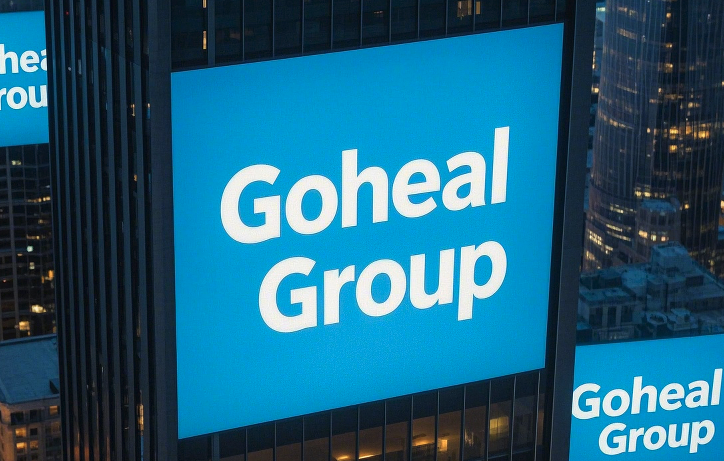"A journey of a hundred miles begins with a single step." As the old saying goes, the most difficult thing is not to start, but to persist, especially in the smokeless battlefield of the capital market. At the end of 2024, the new round of delisting system reforms of the Shanghai and Shenzhen Stock Exchanges, like a sharp blade out of its sheath, cut through the old fantasy of shell resources - financial fraud, main shells, and sluggish stock prices, can no longer rely on "edge balls" to survive.
For a while, the wind of "protecting shells" stopped, and the wave of "reorganization" rose. Even some capital magic that was once known as "resurrection" was exposed by this new system. In this scene of capital transformation with light and shadow, Goheal chose not to avoid or whitewash, but to take out a scalpel and use a "surgical" capital operation plan to strive for an opportunity for precise treatment for problem companies.
Heat wave hits: "Lesion identification" under the high pressure of delisting
Some people say that under the new regulations, delisting is like installing a "high-voltage power grid" for listed companies. One wrong step will result in a bad reputation at best, and even death at worst. The new delisting regulations in 2024 will no longer give financial data "room for beautification". With the combined effect of multi-dimensional indicators such as profit fraud, negative net assets, abnormal shareholder equity, and sluggish trading volume, almost every item has become a "explosion point" that can be triggered at any time.
This has also led to many "problem companies" being unable to escape the radar and unable to wear "invisible cloaks". The drama that used to attract market imagination with a "restructuring plan" and boost market value with a "planned war" has now become a "counter-gimmick" in the market. Against this background, Goheal believes that the capital operation of problem companies is no longer as simple as "polishing and packaging", but to accurately identify lesions like a surgeon and perform "debridement + remodeling" surgery.

American Goheal M&A Group
Before the operation: three types of companies, three processing logics
Capital surgery is not a panacea for "curing all diseases", it requires scientific pre-diagnosis and reasonable classification. In practice, we found that "problem companies" under the high pressure of delisting can be roughly divided into three types:
The first type is the "injury type", such as the typical "shell company" with stagnant main business, bleeding cash flow, and extremely disordered shareholder structure; these companies no longer need "nutritional injections", but a major operation of "clearing + restructuring", including asset divestiture, debt restructuring, change of control and even comprehensive blood transfusion.
The second type is the "mild infection type", such as companies whose main business is still there but are temporarily losing money due to the cycle, and whose financial data are on the edge of the line. These companies are expected to regain vitality without losing the "shell" by introducing strategic investors, accelerating mergers and acquisitions, and optimizing the reporting structure.
The third category is the "potential unactivated type", such as technology companies with core technologies but underestimated, consumer companies with brands but lack of cash. These companies often fall into difficulties due to strategic sluggishness or financing obstacles. Goheal tends to help them break through through the combination strategy of "technology licensing + cash injection + M&A expansion".
These diagnostic models are not just talk, but empirical formulas we have summarized from more than 100 problematic corporate consulting and M&A restructuring projects. In other words, "no surgery" is just to prolong life, and "random surgery" is self-destruction. Accurately identifying the "root cause" is the core logic of M&A restructuring.
The moment of surgery: M&A + restructuring, the three golden paths of surgery
Under the pressure of delisting, simple asset injection and interest transfer have long been unable to impress the market and meet regulatory requirements. Therefore, the "capital surgery" we emphasize must have three key logics: reasonable path, compliance and transparency, and verifiable value.
First, the transfer of control is not a panacea, but a surgical incision. If a problem company wants to be reborn, it must change its original governance structure. Goheal often uses the "virtual-real combination" model of "agreement transfer + voting rights delegation", which can not only reduce acquisition costs, but also quickly realize the replacement of management rights. But please note that once the transfer red line is exceeded, the information disclosure must be true and complete, otherwise it is very easy to trigger a red card for delisting due to "falsified information disclosure".
Second, debt restructuring combined with asset divestiture is a key tool for "cleaning up". Many companies appear to be losing money, but in fact, "negative assets" drag down the financial statements; at this time, through the combination of "debt-to-equity conversion + divestiture of loss-making assets", not only can financial indicators be improved, but also space can be made for new assets. For example, we once operated a photovoltaic company whose main business was suspended and owed 1 billion yuan in debt. We first divested the old project, then ruled on the repayment order through the reorganization court, and finally introduced new energy equity as a new asset. Not only did the shell be successfully protected, but the stock price also doubled and rebounded.
Third, the introduction of war and restructuring is not a slogan, but a "flesh and blood" transaction closed loop. Goheal advocates that the introduction of strategic investors based on real M&A transactions should not only be "negotiated" but also "passed". We once promoted a marginal enterprise on the Science and Technology Innovation Board to complete a comprehensive reversal through the introduction of PE holding M&A targets and the formation of a M&A fund guarantee mechanism, and finally completed a comprehensive reversal with the model of "restructuring + refinancing + M&A closed loop", and the market value increased by 3 times in half a year.
Not just "shell protection": Delisting forces companies to have an opportunity to be reborn
The new regulations are not just for "clearance", but also for "forcing evolution". From this perspective, the delisting crisis has become a deep recuperation for corporate governance and asset reconstruction.
First, the management is forced to prove its innocence. The requirements for information disclosure frequency and financial transparency in the delisting indicators require the management team that originally relied on "fog operation" to show its cards - and also give the acquirer a clearer basis for judgment. When we evaluated a certain ST company, it was through this kind of stress test that we judged whether its team had "resilience" to decide whether to intervene in the controlling stake.
Secondly, the capital market ecology is healthier. In the past, "speculating on shells and riding on hot spots" caused many companies to misallocate resources. Now, the mechanism of "being able to withdraw, enter, and manage" allows institutions with real industrial resources and restructuring capabilities to become the protagonists. Goheal can therefore better play its advantages in global M&A resource integration and post-investment management optimization.
Another thing is that investors' expectations are gradually maturing. In the past, the mentality of "keeping the shell is victory" has now changed to "whether it can continue to make profits after restructuring"; this makes every merger and reorganization no longer a "story marketing" but a "financial interpretation." This is the value for professional M&A service agencies like us - not only "matchmakers of M&A transactions", but also "translators of capital logic."
After the knife falls: Is the problem solved?
There is no doubt that the new delisting rules are the "true detector" of the market. Those companies that really do not have a basic business model, have chaotic governance, and have dishonest information disclosure will eventually be cleared. And those companies that are willing to reform, attract investment, and accept "surgery" still have a chance to "escape from death."
But we also want to ask a question: If delisting is a surgical operation, how should we recuperate after the operation? Capital operation is not a one-shot deal, but a marathon relay. Can the restructured company achieve growth after the injection of new assets? Does it have the ability to continue operating? How can new and old shareholders reach a consensus on interests? These questions are the key to post-operative recovery.
In the problem company transformation project that Goheal is deepening, we pay more and more attention to "post-operative operation" - from board governance, management incentives, to the institutionalization of post-investment supervision. After all, surgery can save lives, but long-term health depends on continuous management.

Goheal Group
The new delisting rules have been implemented, and problem companies are already at the crossroads of fate. So, you and me in the capital market - are we bystanders, liquidators, or rebuilders?
Welcome to leave a message in the comment area, let's discuss this era of "post-operative rebirth" together.
[About Goheal] Goheal is a leading investment holding company focusing on global mergers and acquisitions holdings. It has been deeply involved in the three core business areas of acquisition of listed company control, mergers and acquisitions of listed companies, and capital operations of listed companies. With its deep professional strength and rich experience, it provides enterprises with full life cycle services from mergers and acquisitions to restructuring and capital operations, aiming to maximize corporate value and achieve long-term benefit growth.